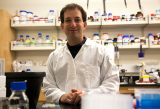Targeted Degradation of Proliferative Transcription Factors in Pediatric Cancers

Background
This proposed research addresses the overarching challenge of finding new, safe and effective interventions for pediatric cancer by discovering a new class of therapeutic molecules that inhibit pediatric cancer cell proliferation. Pediatric cancer cells invariably have defects in the proteins that control when cells grow and divide, a process known as cell cycle regulation. While much effort has gone into developing therapeutics that try to counter a deregulated cell cycle in pediatric cancer cells, few molecules have made it to the clinic, as they suffer from toxicity and poor long-term outcomes. A common problem in pediatric tumors is that a protein called E2F is improperly activated and it improperly induces cell division and proliferation. Deregulated E2F activity is found in the pediatric cancers retinoblastoma, neuroblastoma, rhabdomyosarcoma and acute lymphoblastic leukemia (ALL).
Project Goal
We are testing a strategy to inactivate E2F in these cancer cells by chemically targeting it for destruction. This approach promises to have less toxic side effects because E2F activity can be modulated directly with higher specificity than other cell cycle regulatory proteins. Furthermore, much evidence suggests that E2F-targeted therapy is less vulnerable to acquired resistance via other acquired mutations.
Project Update - June 2020
We are testing a strategy to inactivate E2F in these cancer cells by chemically targeting it for destruction. In this approach, we plan to trick the cell into using its own natural protein recycling to rid itself of E2F. In the first year of our Innovation Grant funding, we have made progress on both of our aims. We have generated the reagents needed to test whether our E2F degradation strategy will be effective in a proof-of-concept experiment, and we have developed an assay to identify drug-like molecules that could ultimately be used to specifically treat cancer cells with over-active E2F. We are poised to finish our aims in the coming year and excited to see the results.

